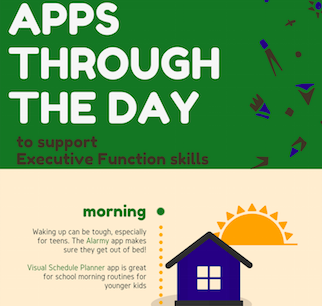No matter what the age or disposition of your child, parenting is a tough job. Add Executive Function  challenges to the mix and life can go from joy to confusion in a matter of minutes.
challenges to the mix and life can go from joy to confusion in a matter of minutes.
If your child has Executive Function challenges, your entire day is a potential minefield of frustrating scenarios — but hold on, your friendly neighborhood Executive Function coach has some solutions for you to regain some calmness in your life!
Morning rush hour
Ten minutes before the entire family needs to be out the door, your child is on the couch, in pajamas, perusing the latest Rick Riordan novel. “Why are you not dressed?” you ask. Ten minutes later, your child is still on the couch, quietly petting the cat. You’re at your wits’ end. Every morning is a mad rush, except you are the only one rushing.
A plan for a calm(er) morning
Setting up a morning checklist can go a long way towards keeping the family on task. For younger children, this might take the form of a simple checklist on the back door or you can make a game out of it by hanging up a picture of them looking ready to go (with backpack, jacket, and shoes on, etc). Set a timer and see how long it takes them to match the picture! You might even consider prizes for beating the high score to date. For older students, this can take the form of a to-do list or reminder app on their phone. If the checklist works, even if only some of the time, celebrate! Praise your child for successfully using that strategy, and while you’re at it, reward yourself. Seriously, you deserve a night out. You’ve helped your family to get out the door on time, without raising your voice, and that is no small feat.
Afternoon (endless) screen time
Before your child even takes her jacket off, she is running towards the computer to watch her favorite YouTube channel. “How was your day, honey?” (no response). “Do you have any homework?” (still no response). Your child has disappeared into the rabbit-hole of the internet. It’s time, you decide, to throw the computer out the window.
A plan to help manage free time
You don’t want to over-schedule your kids, but you’d like to see them doing something more valuable than spending hours in front of a screen every afternoon. Like many things during the tween and teenage years, screen time is often largely about control. Allowing your child to have some choices, where appropriate, while maintaining a watchful parental eye is the key to successful management here. We suggest using an app like TimeStats, which can be found in the Google Chrome store and records how much screen time was used in a day. This can be helpful when trying to set healthy limits. For an application that allows you to track and restrict computer usage, try RescueTime or ScreenTime.
Perhaps you'd like to see your child make some (non-electronic) connections with their peers. While some kids are able to take the initiative by seeking out clubs on their own, children and teens with Executive Function challenges often need help in taking the necessary steps to find such opportunities. Perhaps they’d like to try out a sport. Maybe joining the school rock band sounds appealing. If your child is drawn to role-playing games, a Dungeons & Dragons club might be up their alley. Not only can joining a club build social connections and raise self-confidence, it can serve as an opportunity to improve Executive Function skills such as organization, focus, and emotional regulation.
Evening panic alert
Just when it seems like you might have a moment to relax, read a book, maybe even try out that new mindfulness app, your child comes to you in tears about a missing math worksheet. After talking your child down from the proverbial cliff and combing through assorted belongings, you spot the culprit, crumpled at the bottom of a backpack. You collapse into bed, feeling like you have just finished a marathon. Then comes a knock on your bedroom door… “Mom? Dad? Do we have a soldering iron? I just realized there’s this project due tomorrow.”
A plan for a calm(er) evening
Just as in the morning, a checklist breaking down the evening routine can be helpful. But even with the most effective checklist, setting up an organizational system that enables your child to keep track of papers is crucial, whether it be a low-tech system such as a homework folder, or a higher tech option such as an app to organize papers electronically. If your child uses a computer for homework, create bookmarks, and save logins/passwords on the computer so your child can quickly access websites on which assignments are posted. Lastly, keep a list of classmates who would be willing to send a copy of a homework worksheet in a pinch.
The takeaway
Parenting is not easy. Parenting a child with Executive Functioning challenges is downright exhausting. By anticipating common roadblocks, and learning strategies to manage them, you can model how to use tools to build effective habits and independent skills. In doing so, you help your child to take ownership of their work and manage their time while keeping your sanity in the process (mostly).
Photo credit: Shutterstock
Please see this page for comprehensive information about Executive Function in Elementary students.
Download our infographic, Apps Through the Day for Students, featuring 8 of our coaches' favorite apps for helping students be more organized, focused, and productive.


